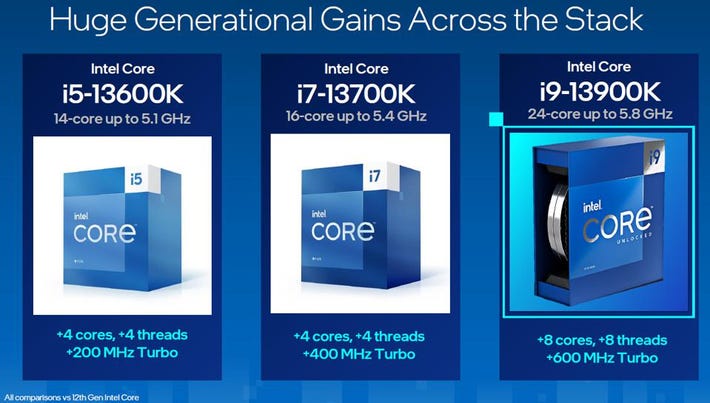
Our take on Intel 13th Gen CPU
Intel's 13th Gen desktop CPUs, also known as Rocket Lake, are the company's latest and most advanced processors for desktop PCs. These CPUs are built on a new Cypress Cove architecture and offer significant performance improvements over the previous generation. They also feature new technologies that make them suitable for a wide range of use cases, from gaming and content creation to data science and machine learning.
In this blog post, we will take a closer look at the features and capabilities of Intel's 13th Gen desktop CPUs and discuss why they are worth considering for your next desktop PC.
One of the most significant improvements in Intel's 13th Gen desktop CPUs is their performance. These CPUs are built on a new Cypress Cove architecture, which is a hybrid of the previous Skylake and Sunny Cove architectures. This new architecture offers improved IPC (instructions per clock) performance and higher clock speeds, which results in a significant increase in performance. The top-of-the-line Core i9-13900K, for example, has a base clock speed of 3.5GHz and a boost clock speed of 5.3GHz, which is significantly faster than the previous generation. This makes them suitable for demanding tasks such as video editing, 3D rendering, and gaming.
Another key feature of Intel's 13th Gen desktop CPUs is their support for PCIe 4.0. PCIe 4.0 is the latest version of the peripheral component interconnect express standard and offers faster data transfer speeds than PCIe 3.0. This is important for high-speed storage devices such as NVMe SSDs, which can benefit from the increased bandwidth.
The 13th Gen CPUs also support Intel's Optane Memory H20, which is a combination of Optane Memory and QLC NAND flash storage that offers faster boot times and improved system responsiveness.
In terms of power efficiency, Intel's 13th Gen desktop CPUs are designed to be highly energy-efficient. They are built on a 14nm process and feature Intel's new SuperFin technology, which improves thermal efficiency and reduces power consumption. This makes them ideal for use in desktop PCs, where power consumption is a key consideration.
The CPUs also support Intel's Dynamic Tuning technology, which adjusts the performance and power consumption of the CPU based on the workload.
One of the most interesting features of Intel's 13th Gen desktop CPUs is their support for Intel's AI-based technologies. These technologies include Intel Deep Learning Boost, which can accelerate AI workloads, and Intel's VNNI (Vector Neural Network Instructions), which can accelerate deep learning inference. These features make the 13th Gen CPUs suitable for use in data science and machine learning applications.
In addition to its performance and power efficiency, Intel's 13th Gen desktop CPUs also offer a number of other features that make them suitable for a wide range of use cases. They support Intel's Turbo Boost Max 3.0, which can automatically boost the performance of the CPU's fastest cores. They also support Intel's Hyper-Threading technology, which allows the CPU to handle twice as many threads as it has physical cores. This can improve performance in multi-threaded applications.
In terms of gaming, the 13th Gen CPUs support the latest technologies such as Intel's Adaptive Sync, which can reduce screen tearing and stuttering. The CPUs also support Intel's Quick Sync Video, which can accelerate video encoding and decoding. These features make the 13th Gen CPUs suitable for gaming and other multimedia applications.
In conclusion, Intel's 13th Gen desktop CPUs, also known as Rocket Lake, are the company's latest and most advanced processors for desktop PCs. These CPUs are built on a new Cypress Cove architecture, which offers improved IPC performance and higher clock speeds.
Custom PCs Australia

Vijay Pal
Intel Optane H20 is not supported on 13th gen. Link to support article – https://www.intel.com/content/www/us/en/support/articles/000057951/memory-and-storage/intel-optane-memory.html#:~:text=The%20Intel®%20Optane™,with%2012th%20and%2013th%20Generations.